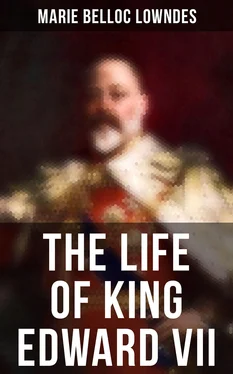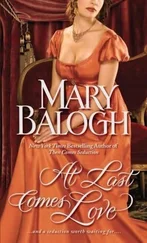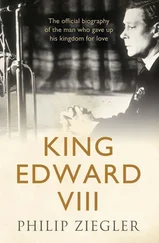It must have required no common discipline and self-control to bear such penalties as those, inflicted by the tongue of scandal, and at the same time to exercise that invariable discretion in reference to the great interests of State which we all admired so much in His Majesty when he was Prince of Wales. We should all regard as extraordinary, were it not that we have become so used to it, the way in which His Majesty contrived over so many years to be in politics and yet not of them; to educate himself in State affairs, while preserving that rigorous impartiality which our constitutional monarchy demands from the Heir to the throne. The sentiments with which he takes up his great task as King, not only of the United Kingdom but also of our vast Colonial Empire beyond the seas, added to the great dependency of India, is significantly shown in a sentence which His Majesty uttered in a speech long ago—that his great wish was that every man born in the Colonies should feel himself as English as if he had been born in Kent or Sussex.
Chapter II.
Birth and Early Years
Table of Contents
King Edward VII. was born on 9th November 1841, at Buckingham Palace. The Duke of Wellington, who was in the Palace at the time, is said to have asked the nurse, Mrs. Lily, “Is it a boy?” “It’s a Prince , your Grace,” answered the justly offended woman.
The news was received with great enthusiasm throughout the country, and Queen Victoria and Prince Albert had thousands of letters and telegrams of congratulation not only through official sources at home and abroad but from many of Her Majesty’s humblest subjects all over the world. Punch celebrated the event in some verses beginning—
Huzza! we’ve a little Prince at last,
A roaring Royal boy;
And all day long the booming bells
Have rung their peals of joy.
And the little park guns have blazed away,
And made a tremendous noise,
Whilst the air has been filled since eleven o’clock
With the shouts of little boys.
At the moment of his birth the eldest son of the Sovereign became Duke of Cornwall. This dukedom was the first created in England. It was created by King Edward III. by charter, wherein his son, Edward the Black Prince, was declared Duke of Cornwall, to hold to himself and his heirs, Kings of England, and to their first-born sons; and it is in virtue of that charter that the eldest son of the Sovereign is by law acknowledged Duke of Cornwall the instant he is born.
At the same time King Edward III. granted by patent certain provision for the support of the dukedom, including the Stannaries, in Cornwall, together with the coinage of tin, and various lands, manors, and tenements, some of which lay outside the county of Cornwall, but were nevertheless deemed to be part of the duchy. From these rents and royalties King Edward VII. derived, when he was Duke of Cornwall, a revenue of about £60,000 a year.
The little prince also became at his birth Duke of Rothesay, Earl of Carrick, Baron of Renfrew, Lord of the Isles, and Great Steward of Scotland (by act of the Scottish Parliament in 1469), but he was not born Prince of Wales. King George IV. was only a week old when he was created Prince of Wales and Earl of Chester by letters patent, but King Edward VII. had to wait nearly a month—till 4th December 1841—for these dignities.
The picturesque origin of the title of Prince of Wales is well known—how King Edward I. promised the turbulent Welsh barons to appoint them a prince of their own, one who was born in Wales and could not speak a word of English, and on whose life and conversation there was no stain at all. Having engaged the consent of the barons beforehand, he showed them his infant son, Prince Edward, who had been born in Carnarvon Castle but a few days before, and who was thereupon acclaimed as the first Prince of Wales. The dignity thus became established as personal, not hereditary, which could be granted or withheld at the pleasure of the Sovereign.
The Earldom of Chester was an early creation which was annexed to the Crown for ever by letters patent in the thirty-first year of King Henry III., when Prince Edward, his eldest son, was immediately granted the dignity. Edward the Black Prince received the Earldom of Chester when he was only three years old, before he was created Duke of Cornwall.
Queen Victoria’s recovery was rapid, as will be seen from the following entry in Her Majesty’s Journal on 21st November, the birthday of the Empress Frederick (Princess Royal of England):—
“Albert brought in dearest little Pussy (the Princess Royal) in such a smart white merino dress trimmed with blue, which Mama (the Duchess of Kent) had given her, and a pretty cap, and placed her on my bed, seating himself next to her, and she was very dear and good. And as my precious, invaluable Albert sat there, and our little Love between us, I felt quite moved with happiness and gratitude to God.”
A little less than a month after the birth of her eldest son, Queen Victoria wrote to her uncle, Leopold I., King of the Belgians:—
“I wonder very much who my little boy will be like. You will understand how fervent are my prayers, and I am sure everybody’s must be, to see him resemble his Father in every, every respect, both in body and mind.”
Christmas with its Christmas tree brought a new fund of delight to the Royal parents. “To think,” wrote the Queen in her Journal , “that we have two children now, and one who enjoys the sight already, is like a dream!” Prince Albert also wrote to his father:—“To-day I have two children of my own to give presents to, who, they know not why, are full of happy wonder at the German Christmas tree and its radiant candles.”
The christening of the Prince of Wales took place on 25th January 1842, in St. George’s Chapel, Windsor, for although Royal baptisms had hitherto been celebrated within the Palace, both the Queen and Prince Albert felt it to be more in harmony with the religious sentiments of the country that the future King should be christened within a consecrated building.
As can be easily understood, the choice of sponsors for the Prince of Wales was a matter of considerable delicacy. Finally the King of Prussia was asked to undertake the office, and Baron Stockmar gives the following interesting account of how His Majesty brushed aside the intrigues which were immediately set on foot:—
“Politicians, as their habit is, attached an exaggerated political importance to the affair. The King, who foresaw this, wrote to Metternich, and in a manner asked for his advice. The answer was evasive; and on this the King determined not to give himself any concern about the political intrigues which were set on foot against the journey. Certain it is, that the Russians, Austrians, and even the French, in the person of Bresson (their Ambassador at Berlin) manœuvred against it. They were backed up by a Court party, who were persuaded that the King would avail himself of the opportunity to promote, along with Bunsen and the Archbishop of Canterbury, his pet idea of Anglicanizing the Prussian Church. When the King’s decision to go became known, Bresson begged that he would at least go through France, and give the Royal Family a meeting; but this was declined.”
The King of Prussia arrived on the 22nd, and was met by Prince Albert at Greenwich and conducted to Windsor.
King Edward’s other sponsors were his step-grandmother, the Duchess of Saxe-Coburg, represented by the Duchess of Kent; the Duke of Cambridge; the young Duchess of Saxe-Coburg (Queen Victoria’s sister-in-law), represented by the Duchess of Cambridge; Princess Sophia, represented by the Princess Augusta of Cambridge; and Prince Ferdinand of Saxe-Coburg.
Читать дальше












